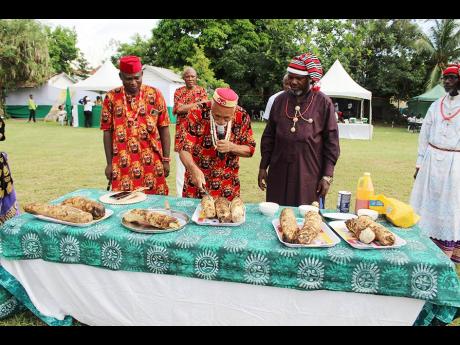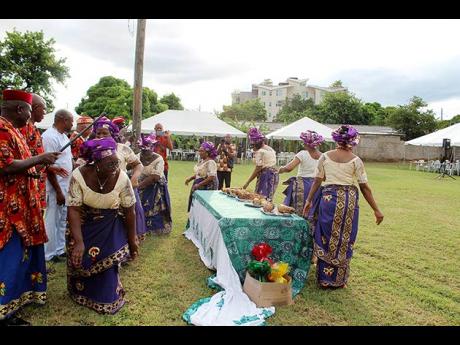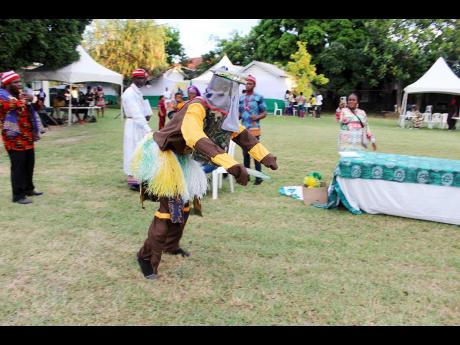Igbo people in Jamaica hold New Yam festival
In Africa, every year the Igbo and other peoples hold a New Yam festival at the end of the rainy season in early August. The iri ji (new-yam eating) festival is to observe the end of a harvest and the beginning of the next work cycle. Yam is not the only crop that is cultivated at the beginning of the planting season, yet it is king of all crops. Thus, the iri ji symbolises the significance of yam in the sociocultural life of the Igbo people.
And in Jamaica there are Nigeria nationals, many of whom are living and working here, while others are here long-term, but are not yet citizens.
But, whatever their status, it is a close-knit community made up of people from its three main ethnic groups: the Yoruba, the Hausa, and the Igbo, who have formed themselves into an organisation called Ndigbo na Jamaica (people from southeast Nigeria living in Jamaica).
And for the past several years, except for 2021 and 2022, Ndigbo na Jamaica has been hosting a new-yam eating festival in the island. The latest observance took place on Saturday, October 29, at the Nigerian High Commission at Waterloo Road in St Andrew.
EXPRESS GRATITUDE
One of the highlights of the evening was the traditional breaking of kola nuts by Professor Ernest C. Madu; Chief Benson Oguaka; Ogbonna Kelechi Christopher, president of Ndigbo na Jamaica; and Chief Dr Joseph Anedu, patron of the festival, who spoke to the audience about the epistemology and industrial significance of the New Yam festival.
Another highlight was the yam-eating ceremony. It started with similarly dressed women dancing while carrying yam to the ceremonial table, on which the yam was presented to the igwis and chiefs, and around which they danced before the yam and other foods were blessed by Pastor Kamalu. The cut new yam was tasted first by Chief Anedu, before it was shared among participants and patrons.
It is an intentional ritual, sometimes filled with much pomp and pageantry. In some Igbo communities, all yams from the previous crop must be consumed or disposed of on the eve of the New Yam festival, and on the day, only dishes consisting of new yam are served, to depict the abundance of the tuber. Thus, the iri ji is sometimes referred to as “bountiful harvest”.
The rituals were traditionally meant to express the gratitude of the people to the gods for making the harvest possible, and they are still widely observed despite more modern changes due to the influence of Christianity. The yam used for the main ritual at the festival is usually roasted and served with salted palm oil ( mmanu nri). Jamaica people love yams - yellow, Negro, white, soft, yampie, St Vincent, Lucea, renta - and as we are mostly the descendants of West Africans, whose diet has always included yam in all its culinary diversity - cooked, fried, roasted, pounded, etc - the symbolism of the cultural connection was not lost on patrons.
SUSTAINING IGBO HERITAGE
In addition to the traditional foods and drinks, there were music and traditional Nigerian dances from men, women, and children, and a drumming performance from Calabar High School, which, incidentally, got its name, Calabar, from a province in Nigeria. There were also performances similar to the Jamaican Jonkonnu, with the majority of the performers being Jamaicans. In a brief award ceremony, Clifford Campbell, Sheila Daley Jones, Dr Naydene Williams and Sharon Cameron Bell were recognised by way of plaques for their contribution to different aspects of Jamaican life.
Also addressing the gathering were Dr Maureen Tamuno, Nigeria’s high commissioner to Jamaica; Jamaica’s minister of culture, Olivia Grange; Dr Emmanuel Nwachuku, chairman of the Iri Ji 2022 Committee; Professor Chukwuemeka Nwokocha; Chile Ambassador to Jamaica Constanza Figueroa; Costa Rica Ambassador to Jamaica Georgina Gillen-Grillo; and Carlos Pascuel Garcia, Spain’s deputy head of mission in Jamaica.
President of Ndigbo na Jamaica, Kelechi , in speaking with The Gleaner after the event, said the turnout was below expectation, though the event was well organised.
It was to “showcase our culture, to join our brothers at home to thank God for bountiful harvest, to get ourself together for unity and progress, and to raise funds for charity purposes as an NGO, and for our brethren in Jamaica and other people around to know how we do it back home,”Kelechi explained.
In a brief, one-on-one interview, Ambassador Tamuno said, among other things, “I want to say to the [Nigerian] peoples in Jamaica, kudos, well done for sustaining the heritage of the Ibo traditions, well done for being very good citizens.” And, in addressing the gathering, Minister Grange said that as the “majority of Jamaicans are of African descent, we naturally connect”.
“And, I am happy that I am here to experience this, to pay my own tribute to the Igbo people, and to also to be embraced by my brothers and sisters from the continent of Africa … . I look forward to our bond being strengthened more and more,” Minister Grange stated.



